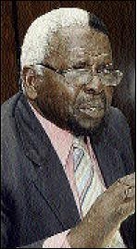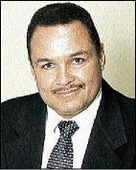Don't fight Church on 'flexi' workweek - Nelson
Published: Friday | March 13, 2009


( l - r ) Nelson, Charles
DWIGHT NELSON, a senior Government minister, warned Wednesday against doing battle with the Church over the proposed implementation of a seven-day 'flexi' workweek, hinting at dire political consequences.
"If the Church maintains its opposition to a seven-day 'flexi' workweek, let me make it abundantly clear, I would not be party to any attempt to enter into battle with the Church," he told his colleagues in Parliament, during committee deliberations on flexible work arrangements.
Senator Nelson advised that a compromise be reached between the position of the Church and the proposed flexible work policy.
Discussions on flexible work arrangements started in 1997 and, according to Senator Nelson, 12 years later, no progress had been made.
Blatant discrimination
Earl Thames, convenor of the Concerned Church Leaders Group, argued that the seven-day 'flexi' week would expose workers and young job seekers to blatant discrimination by employers.
"The employer, without giving any reason, could easily prejudice persons who say 'I would like Saturday off' or 'I would like Sunday off'," said Thames, who made a presentation to the committee Wednesday in Gordon House. "We saw the danger of the employer saying, 'we will not employ persons who ask for these days'," he said.
The clergyman said the group had been advocating a five-day 'flexi' week with a shift system, which he claimed would have fulfilled a number of requirements, such as improved productivity.
Committee member Andrew Gallimore challenged some of the concerns raised by the Church, pointing to developed countries, which, he said, had introduced flexi work arrangements with the Church's compliance.
However, Thames said there was a radical difference between developed and developing countries with regard to job opportunities.
"Right now, some countries in Europe which have been trying the 'flexi' workweek are reconsidering it," he said.
He urged the committee to get an update internationally, before pressing ahead with the plan in Jamaica. "What had at first been accepted with open arms was being retreated from right now internationally," he said.
Charles' assurance
Chairman of the committee and Minister of Labour Pearnel Charles gave the assurance that flexible work arrangements would protect the religious person, giving him the right to "negotiate with the employer his day of rest".
He stressed that the proposed new arrangements would not trample on the "right of the worker" to his day of worship.
Charles said legislation containing sanctions would be drafted to protect the worker who loses his job because he did not want to work on a particular day set aside for worship.
Princess Lawes, a Seventh-day Adventist advocate, said the Church was willing to strive for a "middle ground" on the basis that the right of the individual to his day of worship was protected.
The Sabbath was non-negotiable, she said, adding that it was a divine instruction that an Adventist could not violate.



( l - r ) Gallimore , Lawes, Thames








